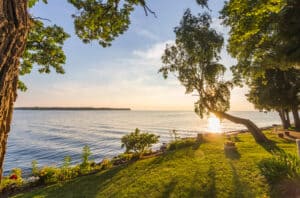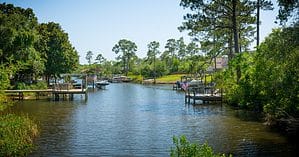Georgia is known for its diverse geography, ranging from the coastal plains to the Blue Ridge Mountains. Among its many natural wonders, Georgia is also home to several artificial lakes that offer a variety of recreational opportunities and economic benefits to the state. Artificial lakes, also known as reservoirs, are created by constructing dams across rivers or streams, forming a large body of water. These lakes play an important role in Georgia’s economy, providing opportunities for tourism, real estate development, and water supply. In this article, we’ll discover the oldest artificial lake in Georgia. We’ll also explore the lake’s history, geography, wildlife, plant life, importance, and threats. Finally, we’ll look at the human population around the lake and conservation efforts.
The Oldest Artificial Lake in Georgia
Jackson Lake, located in central Georgia, is the oldest artificial lake in Georgia. It’s a significant natural resource in the state that provides many ecological, social, and economic benefits to the surrounding communities. Jackson Lake is a popular recreational destination for fishing, boating, and swimming, attracting tourists nationwide. In addition to its recreational importance, the lake also plays a crucial role in supporting the diverse plant and animal species that call it home, making it an important ecological resource.
The History of Jackson Lake, the Oldest Artificial Lake in Georgia
Jackson Lake has a long and storied history, dating back to the early 1800s when the area was home to Native American tribes. Over time, the land changed hands several times, with various groups using the area for different purposes. Then, in the early 1900s, the Georgia Railway and Power Company (now Georgia Power) began acquiring land in the area to build hydroelectric power plants.
Formation of the Lake
In the 1910s, the Georgia Railway and Power Company began constructing a dam on the Ocmulgee River, which would later create Jackson Lake. The dam was completed in 1911, and the lake was named after the town of Jackson, which is located near the southern end of the lake.
Early Use of the Lake
In the early days, the lake was primarily used for generating hydroelectric power. It also quickly became a popular recreational destination for:
- Fishing
- Boating
- Other water-based activities
The lake’s clear waters and scenic surroundings drew tourists from across the country, and several resorts and camps were established around it to accommodate visitors.
Development of the Area
As the popularity of Jackson Lake grew, so did the development around the lake. In the 1920s and 1930s, several new communities were established, including the town of Jackson and the communities of High Falls and Flovilla.
In the following decades, the lake continued to attract new residents and businesses, leading to the development of marinas, restaurants, and other amenities.
Today, the lake remains a popular destination for recreation and tourism, and the surrounding communities continue to grow and thrive.
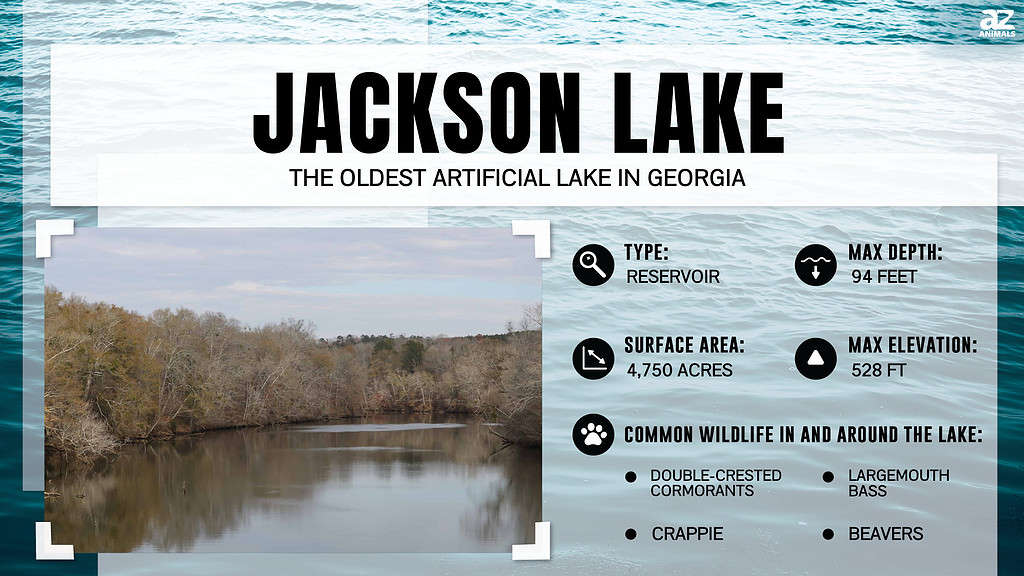
Geography and Features of the Oldest Artificial Lake in Georgia
Jackson Lake is located in central Georgia, spanning parts of Butts, Jasper, and Newton counties. The lake covers an area of approximately 4,750 acres and has a maximum depth of 44 feet.
Location and Size
The lake is situated on the Ocmulgee River, with the Jackson Dam located near the lake’s southern end. The lake’s shoreline stretches for over 135 miles, offering ample opportunities for fishing, boating, and other water-based activities.
Recreational Activities
Jackson Lake is a popular destination for fishing enthusiasts, with a variety of fish species found in its waters.
Boating is also a popular activity on the lake, with several marinas and boat ramps providing easy access to the water.
Other recreational activities include swimming, camping, hiking, and wildlife watching, making the lake a popular destination for tourists and locals alike.
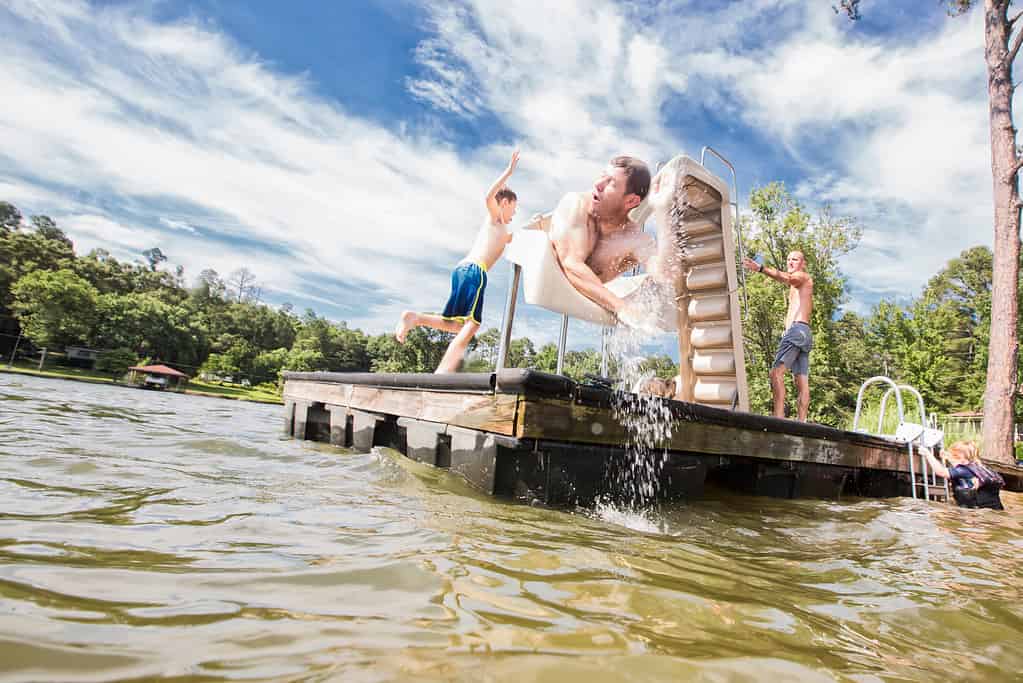
Today, Jackson Lake remains a popular destination for recreation and tourism, and the surrounding communities continue to grow and thrive.
©Image Source Trading Ltd/Shutterstock.com
Wildlife at Jackson Lake
Jackson Lake is home to a diverse range of plant and animal species, many of them endemic to the region. The lake’s rich aquatic ecosystem provides habitat for various:
- Fish
- Reptiles
- Amphibians
- Birds
This has made it a popular destination for wildlife enthusiasts.
Animal Species
Several animal species can be found in and around Jackson Lake, including:
The lake is also home to several species of turtles, including the Eastern river cooter and the common snapping turtle.
Bird Species
Birdwatchers will be pleased to know that Jackson Lake is an excellent location for observing a variety of bird species. The lake’s diverse habitats support a wide range of bird species, including:
- Double-crested cormorants
- Great blue herons
- Ospreys
- Bald eagles
Fish Species
Jackson Lake is a popular fishing destination, with various fish species found in its waters. Among the most commonly caught fish in the lake are:
The lake also supports several other fish species, including striped bass and hybrid bass.
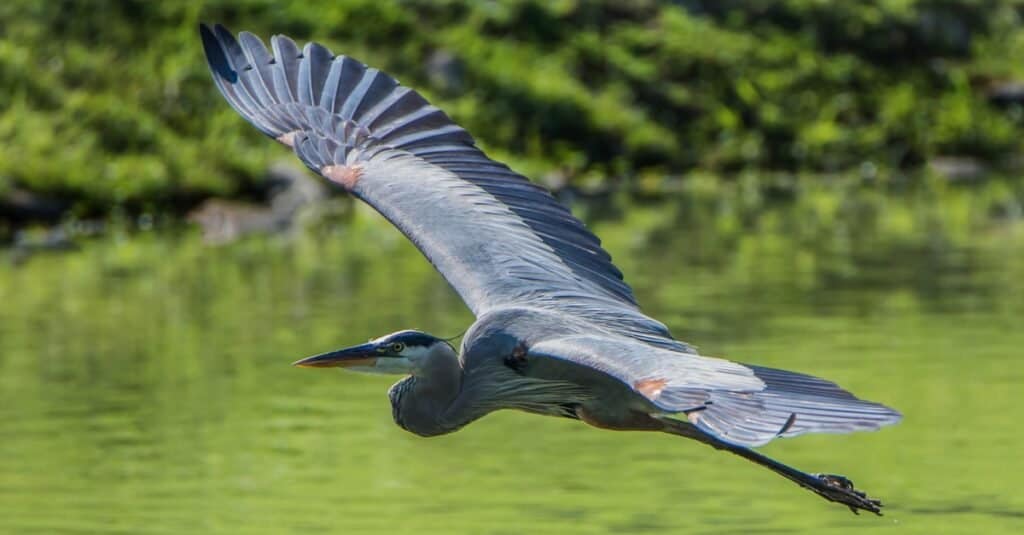
Birdwatchers will be pleased to know that Jackson Lake is an excellent location for observing a variety of bird species, including great blue herons.
©Tom Franks/Shutterstock.com
Plants around Jackson Lake
In addition to its rich wildlife, Jackson Lake is also home to various plant species, many of which are unique to the region. The lake’s surrounding forests and wetlands provide a habitat for diverse plant species, ranging from towering trees to delicate wildflowers.
Forests
The forests surrounding Jackson Lake are dominated by a mix of hardwood and pine trees, including species such as:
- Oak
- Hickory
- Sweetgum
These forests provide habitat for a variety of wildlife species, as well as serving as important carbon sinks and helping to maintain the region’s ecological balance.
Wetlands
The wetlands around Jackson Lake host various plant species, including several species of aquatic plants such as:
- Water lilies
- Duckweed
- Cattails
These plants provide habitat for various wildlife species, including:
- Waterfowl
- Amphibians
- Fish
Wildflowers
In addition to the larger plant species found around Jackson Lake, the area is also home to a variety of wildflowers, which bloom throughout the year. These delicate plants include species such as:
- Butterfly weed
- Black-eyed Susan
- Indian paintbrush
They provide important food and habitat for a variety of insect and bird species.
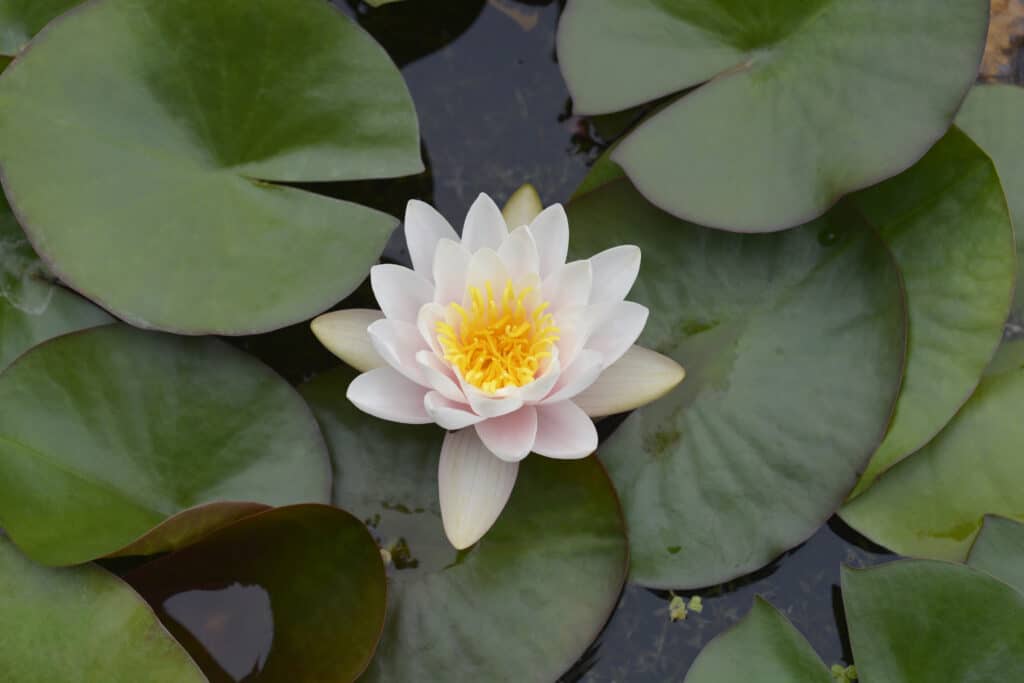
The wetlands around Jackson Lake host various plant species, including several species of aquatic plants such as beautiful water lilies.
©iStock.com/Nahhan
Human Population Around Jackson Lake
Jackson Lake is surrounded by several small towns and communities, many of which rely on the lake for their livelihoods and recreation.
Demographics
The population around Jackson Lake includes a mix of full-time residents and seasonal visitors. The demographics of the surrounding communities vary, with some areas being predominantly rural and others having more urban characteristics. The region is home to a diverse mix of people, including:
- Families
- Retirees
- Young professionals
According to the United States Census Bureau’s data from 2020, the combined population of the three counties (Butts, Jasper, and Newton) in which Jackson Lake is located is approximately 221,000. Note that this figure represents the total population of the counties, not just the population immediately surrounding the lake.
Residential Development
The area around Jackson Lake has seen significant residential development in recent years. Many new homes and vacation properties have been built along the lake’s shoreline. This development has brought new residents to the area, who are attracted by the lake’s natural beauty and recreational opportunities.
Importance of Jackson Lake, the Oldest Artificial Lake in Georgia
Jackson Lake is an important natural resource with numerous ecological, economic, and recreational benefits.
Ecological Importance
The lake’s diverse aquatic and terrestrial ecosystems are a habitat for diverse plant and animal species, many of which are rare or endangered. The lake also serves as an important water source for the surrounding communities, providing drinking water and irrigation for agricultural purposes.
Economic Importance
The lake plays an important role in the local economy, providing jobs in the tourism and recreation sectors. Fishing, boating, and hunting licenses also contribute to the local economy. In addition, the lake’s surrounding forests provide valuable timber resources.
Recreational Importance
Jackson Lake is a popular destination for:
- Boating
- Fishing
- Other recreational activities
The lake’s clear waters and scenic shoreline make it an ideal location for:
- Swimming
- Water sports
- Picnicking
The lake also has several parks and recreational areas, including the popular Indian Springs State Park.
Cultural Importance
The lake has significant cultural importance for the surrounding communities, serving as a site for traditional fishing and hunting practices. The lake and its surrounding areas also have important historical and archaeological significance, with several Native American sites and historical landmarks located in the area.
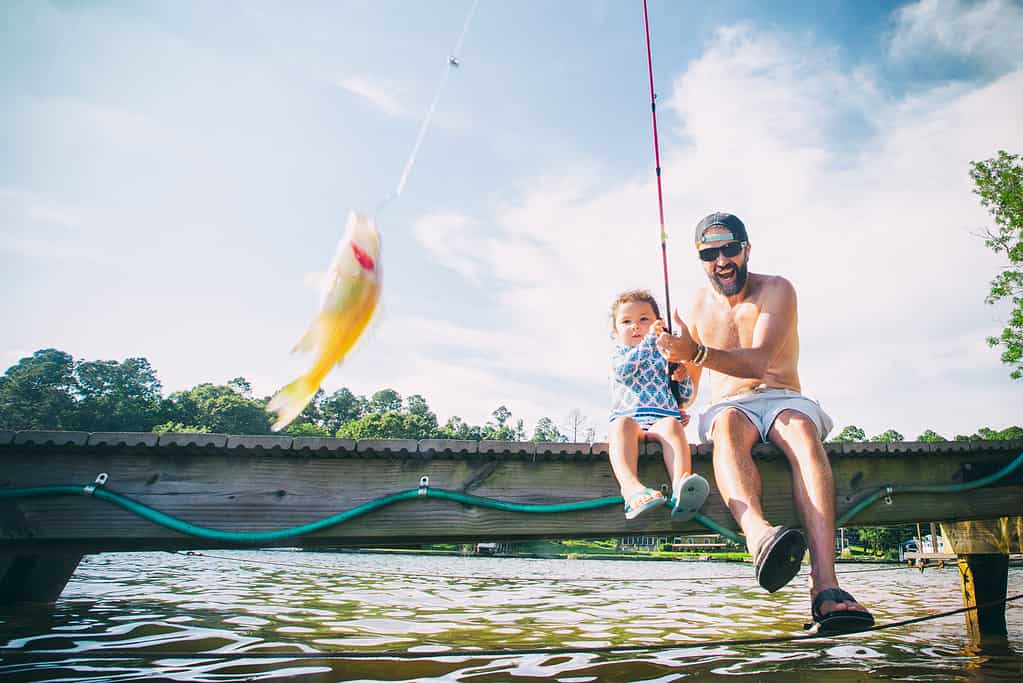
Jackson Lake is a popular fishing destination for both residents and tourists.
©Image Source Trading Ltd/Shutterstock.com
Threats to Jackson Lake
Despite its many ecological, economic, and recreational benefits, Jackson Lake faces several threats that could significantly impact its health and sustainability. They include:
- Water quality
- Invasive species
- Development and land use
- Climate change
Water Quality
One of the biggest threats to Jackson Lake is poor water quality. It can be caused by runoff from residential and agricultural areas or other sources such as sewage and industrial waste. This can lead to harmful algal blooms and other water quality issues that significantly impact aquatic ecosystems and human health.
Invasive Species
Invasive species, such as zebra mussels and hydrilla, can also pose a significant threat to Jackson Lake. These species can outcompete native species, disrupt ecosystems, and cause significant economic damage.
Development and Land Use
The rapid growth of residential and commercial development around the lake has also raised concerns about its long-term sustainability. Increased development can lead to habitat loss and fragmentation, as well as increased runoff and pollution from impervious surfaces.
Climate Change
Climate change is also a growing concern for Jackson Lake. Rising temperatures and changing precipitation patterns have the potential to alter the lake’s ecosystem and impact water availability in the region.
Conservation Efforts
Efforts are underway to protect and preserve Jackson Lake and its surrounding ecosystem. They include:
- Water quality improvement
- Habitat restoration
- Sustainable development
- Education and outreach
Water Quality Improvement
One major focus of conservation efforts is improving water quality in the lake. Local organizations and government agencies are working to reduce pollution and runoff from residential areas, farms, and industrial sites to reduce the negative impacts of these activities on the lake’s ecosystem.
Habitat Restoration
Another important conservation strategy is habitat restoration, which involves restoring and protecting natural areas around the lake. This can include:
- Planting native plants
- Removing invasive species
- Restoring wetlands and other important habitats
Sustainable Development
In order to balance the economic benefits of development with the need to protect the lake’s ecosystem, many organizations and government agencies are promoting sustainable development practices. This can include measures such as:
- Low-impact development techniques
- Green infrastructure
- Conservation easements to protect natural areas from development
Education and Outreach
Education and outreach programs are important to conservation efforts around Jackson Lake. These programs aim to increase public awareness of the lake’s importance and the need to protect its ecosystem. They also provide information on sustainable practices and ways that individuals can help protect the lake and its surrounding areas.
Key Takeaways
Jackson Lake is a valuable natural resource that provides numerous ecological, economic, and recreational benefits to the surrounding communities. But the lake and its ecosystem face many threats, including pollution, habitat loss, and unsustainable development practices.
Efforts are underway to protect and preserve the lake and its surrounding areas through water quality improvement, habitat restoration, sustainable development practices, and education and outreach programs.
Where is Jackson Lake Located on a Map?
Jackson Lake is about an hour southeast of Atlanta. It is still owned and operated by the Georgia Power Company. Jackson Lake is formed by the confluence of the Yellow, Alcovy, and South Rivers along with ample waters from the Tussahaw Creek. The lake’s outlet below the dam is the Ocmulgee River.
The photo featured at the top of this post is © Quentin Manning/Shutterstock.com
Thank you for reading! Have some feedback for us? Contact the AZ Animals editorial team.




